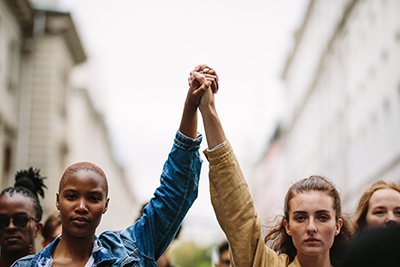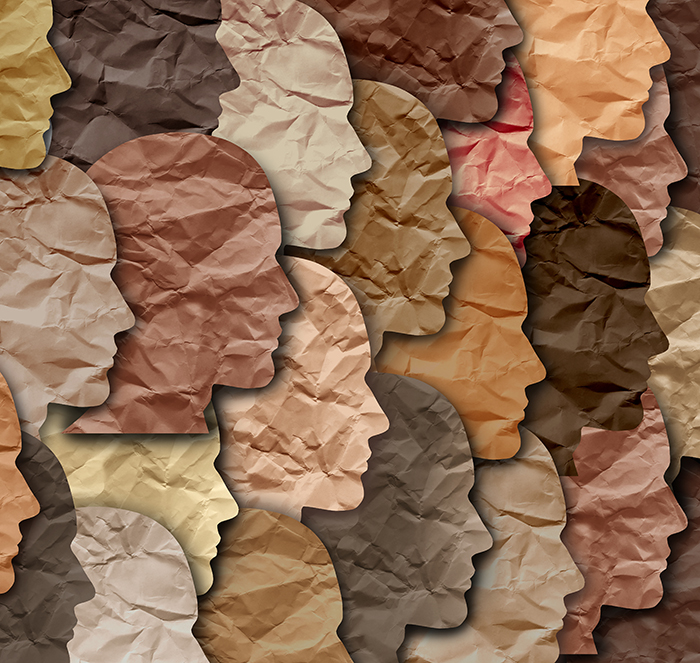A possible America begins with anti-racist training
Racism is not American. Talking about and fighting racism is.
Posted on September 23, 2020

On Sept. 4, President Donald Trump pledged to identify and cancel all anti-racist training contracts for federal government agencies, calling them “divisive, un-American propaganda trainings,” while directing the Office of Management and Budget to issue guidelines on defunding racial-justice work. At the same time, the Department of Justice has been investigating the city of Seattle’s racial-equity trainings with the apparent intention of intimidating local governments into retreating from the work. And earlier this month, journalist Bob Woodward revealed that Trump dismissed the notion he held any white privilege, saying, “No, I don’t feel that way at all.”
Why is Trump — who refused to meet with Jacob Blake in Kenosha, Wisconsin, while excusing the actions of accused killer Kyle Rittenhouse, who is white — targeting racial-equity work in cities like Seattle?
Racial-equity work focuses on undoing systemic racism in organizations, institutions and governments. Programs like those in the city of Seattle, which we helped to launch over a decade ago, examine how to change the structures that preserve and reproduce disparate impacts for whites, Black and Indigenous people, as well as all people of color.
Trainings are but a small part of the larger commitment that Seattle and hundreds of other governments have made to undo institutional racism. They stem from a recognition that governments have historically played a central role in creating and maintaining policies, measures and laws that segregated, excluded and disenfranchised Black, Indigenous and other communities of color. And they are responding to the needs and demands of communities that have transformed culturally and demographically over the past half-century.
Racial equity work is quintessentially American, the product of communities coming together to devise innovative solutions to long-standing problems for and by the people. In this historic moment when the COVID-19 pandemic, state violence against the Black community, an environmental crisis and an economic recession are exposing the horrifying impact of racial inequities between white people and people of color, a new national consensus is building up from communities across the country.
Our research of tens of thousands of government employees finds that nine out of 10 agree that it is important to examine and discuss the impacts of race. This interest in directly addressing the impact of racism mirrors broader trends. The overwhelming majority of Americans believe that racial discrimination is a major problem in this country. Strong majorities of all racial groups, including white people, agree that being white is an advantage in getting ahead in this country. The emerging consensus could lead us to what the Rev. William Barber calls “the Third Reconstruction … where peace is established through justice, not fear.”
Yet Trump would cut off the conversation before it could get started, beginning with cautious but candid discussions of white privilege in the workplace. You can’t change a thing if you can’t name a thing. Trump and his supporters would rather we not be able to talk about race and racism at all. And so this brings us to the question of why Trump would silence the very discussions that would lead us toward greater racial justice.
Trump does not believe in a democracy that wants to remedy the legacies of racism, preferring a nation that preserves white male privilege. To do so, he exacts what Rev. Barber calls “attention violence, holding on to power by manipulating old fears to divide and conquer people whenever we (start) to come together on one issue or another.” If you can’t prevent people from talking and working together to overcome racism and inequity together, then just call it “un-American” and ban it.
That is why Seattle Mayor Jenny Durkan told The Seattle Times, “At this historic moment, it is alarming DOJ thinks (its attack on the city of Seattle’s racial-justice work) is a responsible use of resources … We can reasonably assume this effort falls into the president’s ongoing campaign to stoke white nationalism and inspire fear and hatred across our country.”
The goal of racial-justice work has always been to move us toward what Vincent Harding once called “a possible America,” where racial inequities can be eliminated, and we might together imagine and experience a multiracial democracy in which we all can achieve our highest potential. But Trump continues to try to block our imaginations from soaring. Instead, as Dr. Ibram X. Kendi put it, “To say anti-racism is anti-American is to say racism is American, which is to say Trump wants white Americans to be racist.”
But when whites don’t want to be racist, who is Trump trying to protect? Just himself. Racism isn’t American. Talking about and fighting racism is.
Glenn Harris is president of Race Forward, a national nonprofit organization dedicated to advancing racial justice. In 2005, he helped set up the city of Seattle’s Race and Social Justice Initiative.
Julie Nelson is senior vice president of programs at Race Forward, a national nonprofit dedicated to advancing racial justice. In 2005, she helped set up the city of Seattle’s Race and Social Justice Initiative.
SEE ALSO:
More Race Relations Articles
Sexual Bias Articles
Mental Health Articles
How Drugs and Alcohol Affect the Brain and Body
WA. Counselor Directory: find a therapist near you
How helpful is this web page to you?
(and how can we can improve this page for you?)
not helpful
very helpful
Other Articles
Race in America: policing, kneeling
Letters to the Editor, Northwest Voices, Opinion
Change policy culture “How police unions became such powerful opponents of change” [June 6, Nation), misses options to change police culture before officer contact with a union. The polic... read more
Percentage of Black residents in Seattle is at its lowest point in 50 years
For Seattle, the 2010s were transformative, and not just in terms of population growth. As the cost of living skyrocketed and gentrification spread across the city, many neighborhoods were fundamentally chan... read more
How history has led to an extraordinary moment
Aaron Dixon has seen a lot in his 71 years. The leader of Seattle’s Black Panther Party in the height of the turbulent 1960s, Dixon lived through the uprisings after the murder of the Rev. Dr. Martin L... read more
Structural racism and systemic change in education
How you can get involved in educational changes
Education Lab: Seattle Times July 19, 2020 Education Lab is a Seattle Times project that spotlights promising approaches to persistent challenges in public education. It is produced in partnership with t... read more





